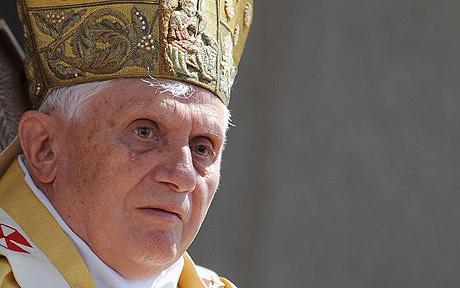By Jonathan Wynne-Jones
The Telegraph
November 20, 2010
http://www.telegraph.co.uk/news/newstopics/religion/the-pope/8148883/Pope-Benedict-XVI-theological-consensus-that-the-Pope-is-morally-justified.html
 |
| After decades of staunch opposition from the Catholic Church to the use of condoms, his comments are likely to cause astonishment |
Flying to Cameroon for his first papal visit to the continent, his words were viewed by critics as confirmation of a Church out of touch with the modern world.
It was further proof of a Pope more concerned with upholding dogma and tradition than risking change to tackle an epidemic that leaves two million people dead each year, they said.
This week however, the German pontiff will say for the first time that there are some circumstances in which it can be acceptable for condoms to be used.
While the Pope restates Catholicism's objections to contraception and stresses its emphasis on abstinence as the best policy to fight Aids, he says that using a condom could be a responsible act if it is intended to prevent the spread of the virus.
The pontiff's comments are made in a book to be published by the Vatican this week, which has been the subject of increasing anticipation.
The publicists were not exaggerating when they sent out an email last week saying the Pope delivers "answers that will surprise and impress both critics and his fans".
"Benedict XVI has shown himself time and again to be the 'Pope of surprises'," it said.
After decades of staunch opposition from the Catholic Church to the use of condoms, his comments are likely to cause astonishment.
Not only does it represent a hugely significant shift in the Church's teaching, but the softening in its position is coming from a Pope who took office with a reputation for being hardline and fundamentalist.
Perceived as the Vatican's enforcer after heading its Congregation for the Doctrine of the Faith – formerly known as the Holy Office of the Inquisition, he is challenging this image by showing himself willing to embrace change.
The Pope's reluctant support for condom use in certain circumstances is likely to dismay the most conservative Catholics who believe it is impossible to distinguish the use of condoms as contraceptives and their use as preventers of the transmission of Aids.
Yet it reflects a growing consensus amongst theologians that the stance now adopted by the Pope can be morally justified.
Cardinals, such as Godfried Danneels and Lozano Barragan, have argued that it must be better for an infected man to use a condom if the intention is not to avoid life but to prevent death.
Earlier this year, the Most Rev Vincent Nichols, the Archbishop of Westminster, indicated he was sympathetic to a more tolerant approach to condom use, saying he could see "why, in the short term, [the] means that give women protection are attractive".
Cardinal Cormac Murphy-O'Connor, his predecessor, was told by Pope Benedict XVI – who was then Cardinal Ratzinger – that the Church needed to reach an agreed position on the morality of the use of condoms.
A report commissioned by the Vatican in 2006 to try and resolve the issue was shelved after the group failed to reach a consensus.
Although they acknowledged that there was a need to clarify the Church's teaching, cardinals and senior figures in Rome were ultimately too concerned that it was impossible to do so without being misinterpreted.
These concerns appeared to be well founded after Pope Benedict was fiercely criticised for his comments in Africa, which were effectively no more than repeating a well-established Church view that condoms are not the solution to Aids.
Now, however, he has chosen to act alone in trying to move the Church forward on the issue.
Rather than promulgate an edict he has chosen to do it in an interview with Peter Seewald, a German journalist whom he trusts and knows well from his time as Cardinal Ratzinger.
Speaking at the Frankfurt Book Fair earlier this year, Mr Seewald said: "The events in the news around the abuse scandals and the wider situation of the Church naturally give this conversation an incredible explosiveness and I can only already reveal to you now that you are expecting a very exciting, very extensive book."
While the Pope tackles many controversial subjects in the book, from the sex abuse crisis to the Church's teaching on clerical celibacy, his comments on condoms are likely to cause the greatest shock.
They may not go far enough to appease Catholics such as Cherie Blair, who argue for a total acceptance of contraception, but they show a Pope who can be pragmatic as well as idealistic.
His stance will help to distance the Church from some of its more embarasing statements, such as the claim by a cardinal that the HIV can pass through tiny holes in the rubber of condoms.
Crucially, it may go further in ensuring the Church's relevance in public debate, presenting it as more humane and more flexible – even at the risk of people thinking the Church has changed its mind on the issue.
This desire to secure the Church's place in the public square is at the heart of Pope Benedict's thinking and no doubt the guiding reason behind such a brave move.
"I was, naturally, not always simply against things, exclusively and as a matter of principle," he says in the book.
"Ultimately someone who is in opposition could probably not endure life at all."
Any original material on these pages is copyright © BishopAccountability.org 2004. Reproduce freely with attribution.